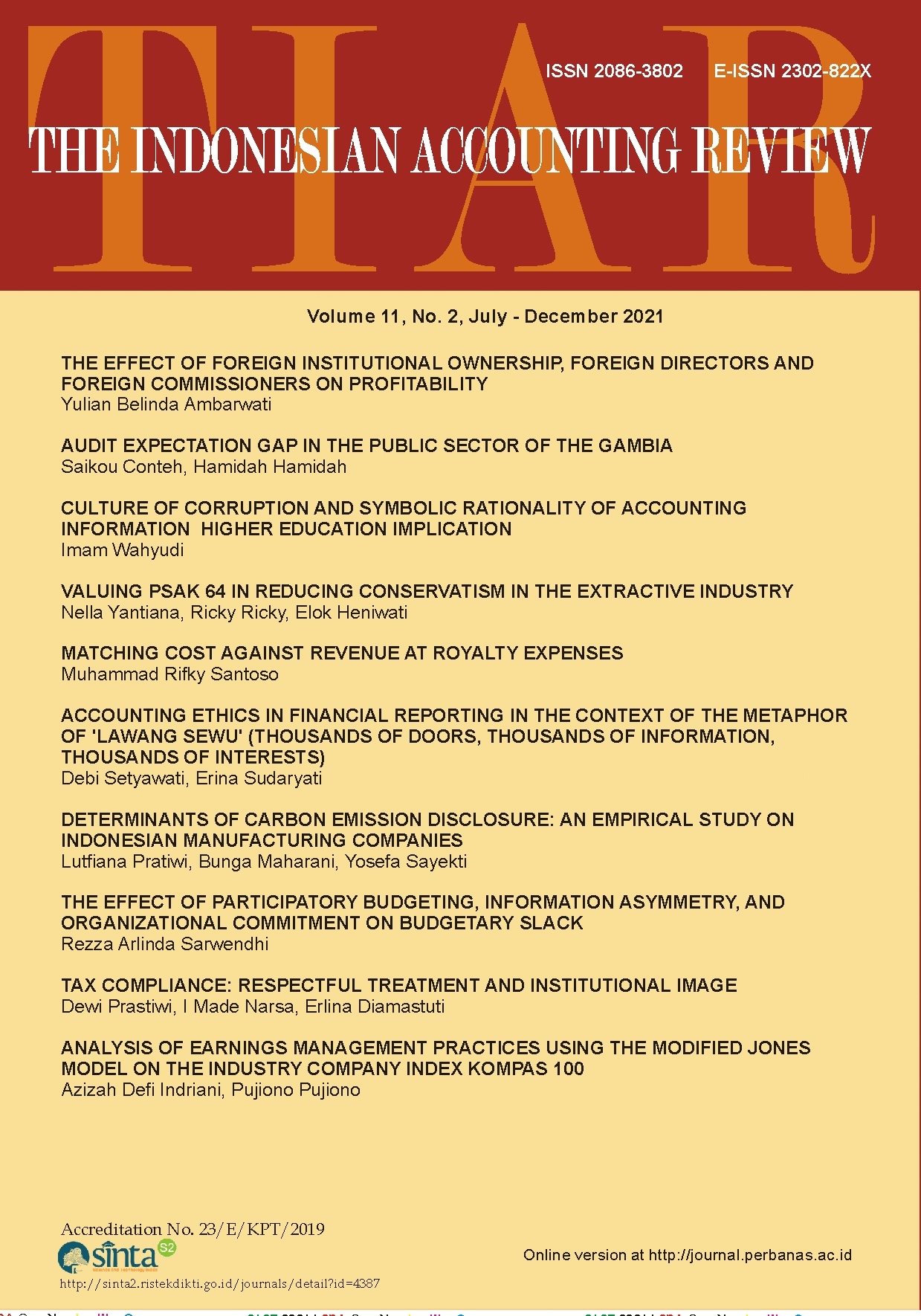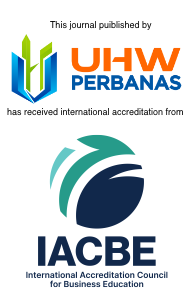Valuing PSAK 64 in Reducing Conservatism in The Extractive Industry
DOI:
https://doi.org/10.14414/tiar.v11i2.2549Keywords:
Exploration aggressiveness, IFRS, Extractive industry, Conservatism, PSAK 64Abstract
In 2011, the Indonesian Institute of Accountants (IAI) issued PSAK 64, which adopted IFRS 6 concerning exploration for and evaluation of mineral resources. It is assumed that this adoption will improve the quality of financial reporting. This current study examines the impact of PSAK 64 implementation and other related factors on financial statement conservatism. The data were collected by using data from extractive industries listed on the IDX over the period 2009-2010 and 2013-2014 to represent before and after IFRS-based PSAK mandatory implementation respectively. This study develops two regression models to analyze first, factors influence on conservatism before implementing PSAK 64 and second, the influential factors after implementing PSAK 64 by interacting among conservatism factors. The study found that exploration aggressiveness has influenced conservatism and there are no influential factors on conservatism when they interact. Generally speaking, there is a no different level of conservatism before and after implementing PSAK 64. This finding adds a body of literature on the accounting of extractive industry in Indonesia and is prospective for countries having yet adopted IFRS.
References
Abdulrahman, B. A., & Abdal, K. I., 2019, 'The critical discussion of the IFRS 6 and mineral resources exploration and evaluation cost', Journal of Arts, Literature, Humanities and Social Sciences, vol. 41, (August 2019), pp. 401–417. https://doi.org/10.33193/jalhss.41.25
Ahmed, M. U., 2020, 'Divergence within IFRS adoption : the case of depreciation practices of listed banks in Bangladesh', The Indonesian Accounting Review, vol. 10, no. 2, pp. 169–181. https://doi.org/10.14414/tiar.v10i2.2064
Al-Thuneibat, A., 2018, 'The relationship between the ownership structure, capital structure and performance', JABM Journal of Accounting-Business & Management, vol. 1, no. 25, pp.1–20. https://doi.org/10.31966/jabminternational.v1i25.326
Barhamzaid, Z. A. A., 2019, 'Unconditional conservatism under the Chinese version of IFRS', China Journal of Accounting Research, vol. 12, no. 4, pp. 395–409. https://doi.org/10.1016/j.cjar.2019.11.002
Bird, R., Grosse, M., & Yeung, D., 2013, 'The market response to exploration, resource and reserve announcements by mining companies: Australian data', Australian Journal of Management, vol. 38, no. 2, pp. 311–331. https://doi.org/10.1177/0312896212473401
Birt, J., Rankin, M., & Song, C. L., 2013, 'Derivatives use and financial instrument disclosure in the extractives industry', Accounting and Finance, vol. 53, no. 1, pp. 55–83. https://doi.org/https://doi.org/10.1111/acfi.12001
Bodle, K. A., Cybinski, P. J., & Monem, R., 2016, 'Effect of IFRS adoption on financial reporting quality: Evidence from bankruptcy prediction' Accounting Research Journal, vol. 29, no. 3, pp. 292–312. https://doi.org/10.1108/ARJ-03-2014-0029
Clarkson, P., Hanna, J. D., Richardson, G. D., & Thompson, R., 2011, 'The impact of IFRS adoption on the value relevance of book value and earnings', Journal of Contemporary Accounting & Economics, vol. 7, no. 1, pp. 1–17. https://doi.org/https://doi.org/10.1016/j.jcae.2011.03.001
Cortese, C., 2011, 'Standardizing oil and gas accounting in the US in the 1970s: Insights from the perspective of regulatory capture', Accounting History, vol. 16, no. 4, pp. 403–421. https://doi.org/10.1177/1032373211417990
Cortese, C. L., 2013, 'Politicisation of the international accounting standard setting process: evidence from the extractive industries', Journal of New Business Ideas and Trends, vol. 11, no. 2, pp. 48–57. Retrieved from http://ro.uow.edu.au/buspapers/296/
Cullinan, C. P., Wang, F., Wang, P., & Zhang, J., 2012, 'Ownership structure and accounting conservatism in China', Journal of International Accounting, Auditing and Taxation, vol. 21, no. 1, pp. 1–16. https://doi.org/10.1016/j.intaccaudtax.2012.01.001
DeAngelo, L. E., 1981, 'Auditor size and audit quality', Journal of Accounting and Economics, vol. 3, no. 3, pp. 183–199. https://doi.org/https://doi.org/10.1016/0165-4101(81)90002-1
Dimitropoulos, P. E., Asteriou, D., Kousenidis, D., & Leventis, S., 2013, 'The impact of IFRS on accounting quality: Evidence from Greece', Advances in Accounting, vol. 29, no. 1, pp. 108–123. https://doi.org/10.1016/j.adiac.2013.03.004
Fearnley, N., & Gray, S., 2015, 'National institutional factors and IFRS implementation in Europe: The case of investment property companies', International Journal of Accounting and Information Management, vol. 23, no. 3, pp. 271–288. https://doi.org/10.1108/IJAIM-05-2014-0038
Gebhardt, G., & Novotny-Farkas, Z., 2011, 'Mandatory IFRS adoption and accounting quality of European banks', Journal of Business Finance and Accounting, vol. 38, no. 3–4, pp. 289–333. https://doi.org/10.1111/j.1468-5957.2011.02242.x
Guermazi, W., & Khamoussi, H., 2018, 'Mandatory IFRS adoption in Europe: Effect on the conservative financial reporting', Journal of Financial Reporting and Accounting, vol. 16, no. 4, pp.543–563. https://doi.org/10.1108/JFRA-08-2017-0070
Heniwati, E., 2015, 'Measuring companies’ compliance with IFRS-based PSAK disclosures', International Review of Business, vol. 15, pp. 91–110.
Heniwati, E., Yantiana, N., & Desyana, G., 2021, 'Financial health of Syariah and non-Syariah banks : A comparative analysis', Journal of Islamic Accounting and Business Research, ahead-of-p(ahead-of-print). https://doi.org/10.1108/JIABR-07-2020-0216
Hou, Q., Jin, Q., & Wang, L., 2014, 'Mandatory IFRS adoption and executive compensation: Evidence from China', China Journal of Accounting Research, vol. 7, no. 1, pp. 9–29. https://doi.org/10.1016/j.cjar.2013.09.003
Jensen, M. C., & Meckling, W. H., 1976, 'Theory of the firm: Managerial behavior, agency costs and ownership structure', Journal of Financial Economics, vol. 3, no. 4, pp. 305–360. https://doi.org/https://doi.org/10.1016/0304-405X(76)90026-X
Juniarti, J., Helena, F., Novitasari, K., & Tjamdinata, W., 2018, 'The value relevance of IFRS adoption in Indonesia', Jurnal Akuntansi Dan Keuangan, vol. 20. no. 1, pp. 13–19. https://doi.org/10.9744/jak.20.1.13-19
Kabir, H., & Laswad, F., 2015, 'The impact of improvements in institutional oversight on IFRS accrual quality in Europe', Australian Accounting Review, vol. 25, no. 4, pp. 428–444. https://doi.org/10.1111/auar.12084
Kabir, M. N., Worthington, A., & Gupta, R., 2015, 'Comparative credit risk in Islamic and conventional bank', Pacific Basin Finance Journal, vol. 34, no. 327–353. https://doi.org/10.1016/j.pacfin.2015.06.001
Kartika, I. Y., Subroto, B., & Prihatiningtyas, Y. W., 2015, 'Analisa kepemilikan terkonsentrasi dan asimetri informasi terhadap konservatisma akuntansi', Jurnal Akuntansi Multiparadigma, vol. 6, no. 3, pp. 504–511. https://doi.org/10.18202/jamal.2015.12.6040
Koharyanto, J. A., & Christiawan, Y. J., 2013, 'Respon investor di sektor pertambangan terhadap evaluasi pada pertambangan sumber daya mineral', Business Accounting Review, vol. 4, no. 2, pp. 157–168.
Kulikova, L. I., Gubaidullina, A. R., & Arzhantseva, N. V., 2014, 'The need of professional judgement of the accountant in accounting assets of exploration and evaluation of mineral resources', Mediterranean Journal of Social Sciences, vol. 5, no. 24, pp. 65–69. https://doi.org/10.5901/mjss.2014.v5n24p65
Kusumawati, E., & Setiawan, A., 2019, 'The effect of managerial ownership, institutional ownership, company growth, liquidity, and profitability on company value', Riset Akuntansi Dan Keuangan Indonesia, vol. 4, no. 2, pp. 136–146. https://doi.org/10.23917/reaksi.v4i2.8574
LaFond, R., & Roychowdhury, S., 2011, 'Managerial ownership and accounting conservatism', SSRN Electronic Journal. https://doi.org/10.2139/ssrn.929693
Lai, C., Lu, M., & Shan, Y., 2013, 'Has Australian financial reporting become more conservative over time?' Accounting and Finance, vol. 53, no. 3, pp. 731–761. https://doi.org/10.1111/j.1467-629X.2012.00480.x
Li, S., Wu, H., Zhang, J., & Chand, P., 2018, 'Accounting reforms and conservatism in earnings: Empirical evidence from listed Chinese companies', Journal of International Accounting, Auditing and Taxation, vol. 30, pp. 32–44. https://doi.org/10.1016/j.intaccaudtax.2017.12.004
Manganaris, P., Spathis, C., & Dasilas, A., 2016, 'How institutional factors and IFRS affect the value relevance of conservative and non-conservative banks', Journal of Applied Accounting Research, vol. 17, no. 2, pp. 211–236. https://doi.org/10.1108/JAAR-09-2014-0094
Marsoem, R. A. S., & Mita, A. F., 2019, 'Adopsi IFRS, prakiraan laba analis dan penegakan hukum: Studi kasus di Asia', Jurnal Reviu Akuntansi Dan Keuangan, vol. 9, no. 2, pp. 123–136. https://doi.org/10.1093/nq/s1-IX.228.217-a
Marziana, M. M., & Aswadi, A. W. E., 2018, 'International financial reporting standards and conservatism in the Association of Southeast Asian Nations countries: Evidence from Jurisdiction Corruption Index', Asian Review of Accounting, vol. 26, no. 4, pp. 487–510. https://doi.org/10.1108/ARA-06-2017-0098
Mora, A., & Walker, M., 2015, 'The implications of research on accounting conservatism for accounting standard setting', Accounting and Business Research, vol. 45, no. 5, pp. 620–650. https://doi.org/10.1080/00014788.2015.1048770
Nobes, C., 2014, 'The development of national and transnational regulation on the scope of consolidation', Accounting, Auditing and Accountability Journal, vol. 27, no. 6, pp. 995–1025. https://doi.org/10.1108/AAAJ-03-2013-1287
Outa, E. R., Ozili, P., & Eisenberg, P., 2017, 'IFRS convergence and revisions: value relevance of accounting information from East Africa', Journal of Accounting in Emerging Economies, vol. 7, no. 3, pp. 352–368. https://doi.org/10.1108/jaee-11-2014-0062
Piot, C., Dumontier, P., & Janin, R., 2011, 'IFRS consequences on accounting conservatism within Europe: The role of big 4 Auditors', SSRN Electronic Journal. https://doi.org/10.2139/ssrn.1754504
Power, S. B., Cleary, P., & Donnelly, R., 2017, 'Accounting in the London Stock Exchange’s extractive industry: The effect of policy diversity on the value relevance of exploration-related disclosures', British Accounting Review, vol. 49, no. 6, pp. 545–559. https://doi.org/10.1016/j.bar.2017.08.004
Rosdini, D., 2014, 'Dampak penerapan IFRS 6 terhadap konservatisme pada perusahaan pertambangan dan energi di Australia', In Seminar Nasional Akuntansi XVII. Mataram.
Sari, E., & Sarumpaet, S., 2019, 'Conservatism under IFRS in Indonesia', International Journal of Scientific and Technology Research, vol. 8, no. 6, pp. 16–21.
Shimamoto, K., & Takeda, F., 2020, 'IFRS adoption and accounting conservatism of Japanese firms with governance system transition', International Advances in Economic Research, vol. 26, no. 2, pp. 161–173. https://doi.org/10.1007/s11294-020-09788-y
Smith, M., Ren, Y., & Dong, Y., 2011, 'The predictive ability of “conservatism†and “governance†variables in corporate financial disclosures', Asian Review of Accounting, vol. 19, no. 2, pp. 171–185. https://doi.org/10.1108/13217341111181096
Sturdy, J., & Cronjé, C., 2014, AAn analysis of the accounting practices of junior exploration companies in South Africa', Journal of Economic and Financial Sciences, vol. 7, no. 3, pp. 681–696. https://doi.org/10.4102/jef.v7i3.233
Watts, R. L., & Zimmerman, J. L., 1990, 'Positive accounting theory: a ten year perspective. The Accounting Review, vol. 65, no. 1, pp. 131–156.
Wise, T., & Spear, N., 2002, 'Factors and forces of the extractive industry environment, and their implications for accounting measurement and financial reporting', Petroleum Accounting and Financial Management Journal, vol. 21, no. 3, pp. 1–27.
Zeghal, D., & Lahmar, Z., 2018, 'The effect of culture on accounting conservatism during adoption of IFRS in the EU', International Journal of Accounting and Information Management, vol. 26, no. 2, pp. 311–330. https://doi.org/10.1108/IJAIM-08-2016-0077
Zhou, T., Birt, J., & Rankin, M., 2015, 'The value relevance of exploration and evaluation expenditures', Accounting Research Journal, vol. 28, no. 3, pp. 228–250. https://doi.org/10.1108/ARJ-09-2013-0067
Downloads
Submitted
Published
How to Cite
Issue
Section
License
Copyright (c) 2021 The Indonesian Accounting Review

This work is licensed under a Creative Commons Attribution-NonCommercial 4.0 International License.

















